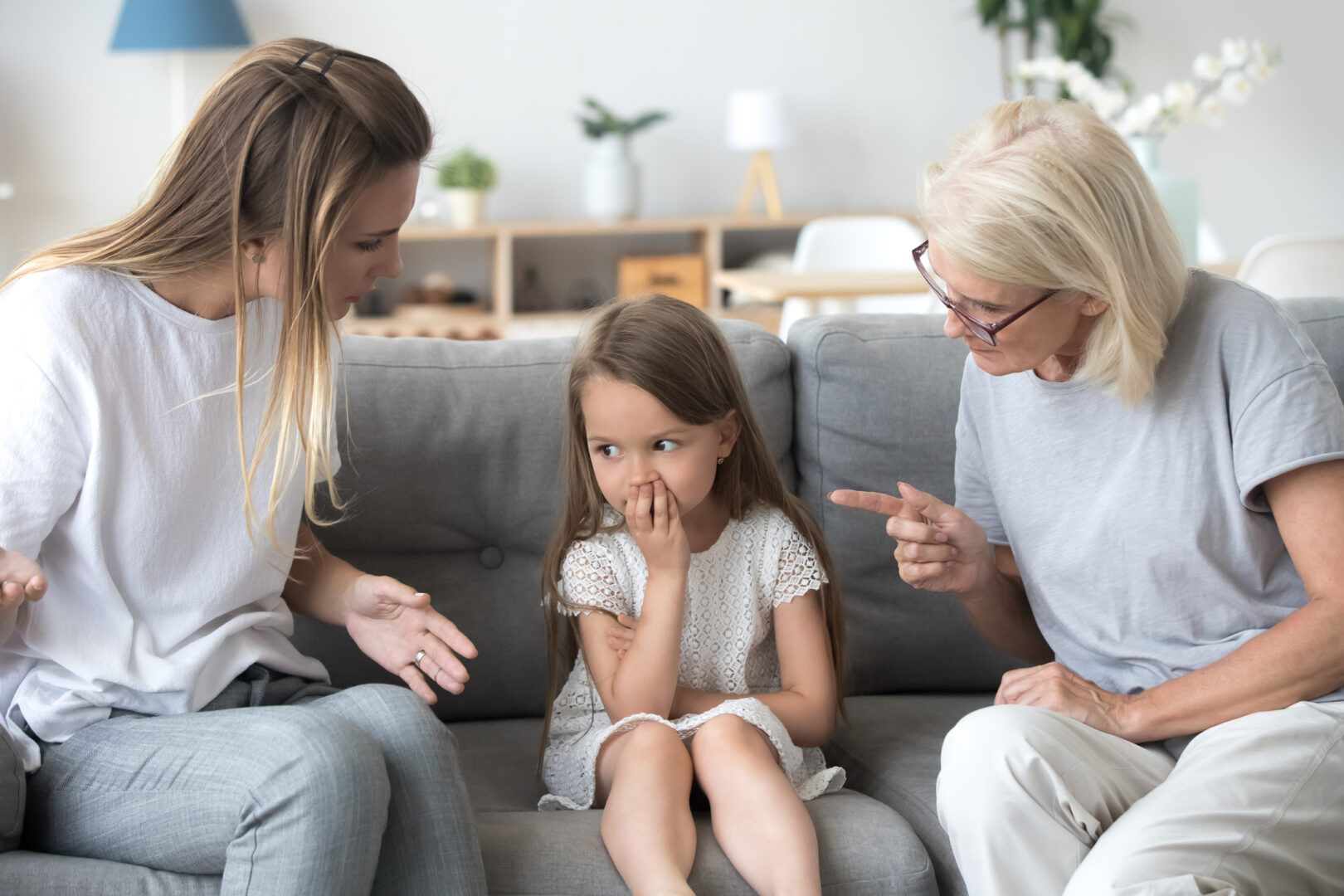In this article
The relationship between parents and grandparents isn’t always easy. They might get on your nerves by reorganizing the baby gear while you’re away or slipping the kids extra cookies after dinner. It’s normal to expect that parents and grandparents won’t always see eye-to-eye, but what happens when a grandparent’s behavior moves into hypercritical, defiant or even abusive territory?
The unfortunate reality is that sometimes grandparents’ behavior can be truly toxic, which can have a negative impact on the whole family. “Normal conflicts and frustrations come with resolutions that both parties are generally accepting of, even if emotions get heated in the moment,” says Kendall Phillips, a licensed professional counselor with CRM Counseling in Deer Park, Texas. “In a toxic situation, there’s no responsibility taken by the other party.” And at least one person is left feeling frustrated, upset, confused or any other number of negative feelings, she says.”
Because you love your parents and in-laws, it may be difficult to admit when the relationship you have with them is toxic. Here, experts share the warning signs of toxic grandparents and how to deal with the problem.
Key takeaways
- Toxic grandparents can negatively impact family dynamics by consistently undermining parental authority, manipulating with guilt, and disregarding boundaries.
- Unlike normal conflict, toxic behavior involves a lack of accountability and leaves others feeling hurt, confused or powerless.
- Experts advise recognizing the signs, setting firm boundaries and limiting or ending contact if necessary to protect your family’s well-being.
What are toxic grandparents?
“Toxic” is a broad mental health term that gets applied to a lot of different people and situations. So, how do you actually know when inappropriate grandparent behavior is actually toxic?
“I have an 80/20 rule in relationships,” says Stephanie Macadaan, a licensed marriage and family therapist and the owner of Renewed Relationships Counseling Group in California. “We want relationships to feel good and easy 80% of the time, but 20% of the time people are going to be tired, cranky, hungry or overwhelmed. We aren’t going for 100% feeling good all the time, but if you notice that the majority of the time it feels bad or damaging, that’s when you know there is a problem.”
Macadaan says the best way to identify toxic behavior is to tune into how interactions with a particular person make you feel. Toxic grandparents may be:
- Critical.
- Competitive.
- Hurtful.
- Degrading.
- Verbally abusive.
“Those are toxic behaviors and not normal conflict,” Macadaan explains.
Join Care for free
What are traits of toxic grandparents?
If you’re wondering what these toxic behaviors look like in action, here are some tell-tale signs you’re dealing with toxic grandparents.
1. They use guilt as a weapon
Toxic grandparents may use guilt as a tool for manipulating you or your kids into giving them what they want, Phillips says. This might look like reminding you of sacrifices they’ve made for you when you try to set a boundary or even lamenting to your kids that you’re being unkind or unfair.
“If you’ve done something wrong that you should make amends for, then guilt may be warranted,” Phillips says. “But you feeling guilty for setting a boundary is how toxic people keep power in a situation. If you haven’t done something worthy of feeling guilty, that’s a good sign that your guilt is misplaced and a boundary is really needed.”
2. They undermine your authority
If they constantly ignore your household rules, encourage kids to disregard your wishes or go behind your back to do things their own way, you’re dealing with red flags. “An adult is an adult,” says Phillips. “Just because you’re a grandparent does not mean that you still get to be the disciplinarian to your adult child. Those days are gone.”
“As a parent, it is perfectly appropriate to put up boundaries,” Phillips continues. “Make those boundaries absolutely clear and speak directly about your needs and expectations when it comes to grandparents.”
“An adult is an adult. Just because you’re a grandparent does not mean that you still get to be the disciplinarian to your adult child.”
— Kendall Phillips, licensed professional counselor
3. They manipulate or intimidate
Toxic grandparents often refuse to admit wrongdoing, says Phillips, and they’ll often use whatever means necessary to avoid having to take responsibility for their behavior, the experts say. They may talk negatively about you to your kids or other people, play favorites with their grandkids or even try to turn the tables on you or your children if they’re called out for wrongdoing.
“They might try to turn spouses or parents and kids against each other,” Macadaan adds. “Or they might try to turn your feelings back on you by claiming they’re actually the victim.”
4. They act like a bully
Grandparents may have wisdom and experience, but that doesn’t mean they get to supercede your authority with your children, criticize you, degrade you or belittle you. “Toxic behavior is most defined by how you feel in a relationship with someone,” Macadaan says. “If you feel degraded, verbally abused, overly criticized or that your feelings are never validated, those are all signs that the relationship is not healthy.”
5. They disregard boundaries
If there’s a line, toxic grandparents will try to cross it. They might frequently show up to your home unannounced, have emotional outbursts when they don’t get their way or attempt to control important situations, like whether or not they’re present at a child’s birth.
“Setting boundaries is an important part of any relationship, but holding them firmly can be harder than you think,” says Macadaan. “People who have traits of toxic behavior often push back on boundaries and don’t respect them.”
“People who have traits of toxic behavior often push back on boundaries and don’t respect them.”
— Stephanie Macadaan, licensed marriage and family therapist
6. They’re not willing to change
“If you are able to talk to them and feel that they understand what you’re saying, even though they may have a different opinion, then that’s a relationship that can be worked on,” Macadaan says. “The key differentiator with a toxic grandparent is if you try to talk and they don’t hear it at all or they push back or criticize you. That’s where it becomes toxic because you can’t feel like an equal part of the relationship.”
7. You’re afraid to confront them
Confrontation isn’t easy or enjoyable for just about anyone, but communicating about issues is an important part of relationships. If you’re afraid to discuss your relationship, needs or boundaries with a grandparent, that’s a toxic situation, says Macadaan. “A big clue is if you feel powerless, silenced and trapped due to fear of confronting the grandparent over their hurtful behavior,” she adds.
How can I deal with toxic grandparents?
Be honest about what you’re experiencing
Sometimes people let toxic, inappropriate grandparent behavior slide out of a sense of fear, obligation or even hope that things will change. “There’s an inner conflict around setting boundaries and taking space with parents or grandparents because those relationships are important to us by nature,” says Macadaan.
You might feel the urge to make excuses for negative behavior or wonder if you’re justified in feeling hurt and frustrated. Perhaps you’re even in a situation where you feel a grandparent’s behavior is toxic, but your spouse isn’t on the same page. “It can feel really confusing because one part of us wants the grandparent we imagine and hope to have, and then we have this other part of us that’s feeling hurt, frustrated and worn out,” says Macadaan.
But in order to protect yourself and your family from a toxic grandparent, you have to be honest with yourself about the relationship you actually have with that person and how their behavior is negatively impacting your family. Think about or talk with your partner about what you’ve observed and how the relationship feels. Macadaan says to ask yourself: “Does this experience fit the way I thought grandparents were going to be?”
If it doesn’t, it’s time to consider what boundaries need to be in place to create a healthier situation.
Get clear about what you need from the relationship
Toxic grandparents may disregard your boundaries, but you still need to set them. The key, says Macadaan, is understanding that you don’t need their input or permission in order to establish your boundaries. “If they’re not willing to hear you, they dismiss you or they get defensive, having a conversation with them about boundaries isn’t really going to help,” Macadaan says.
Instead of sitting down for a long, difficult discussion about boundaries with the grandparent, get clear with yourself and your partner about what you need from the relationship and what rules need to be in place to protect your family’s emotional health.
“Rather than talking about the boundaries with them, it’s really about you knowing what you want to do, and then holding those boundaries in place for yourself and feeling validated in doing that for you,” says Macadaan.
Establish your boundaries
A boundary can be anything from declining to discuss certain topics with a grandparent to letting them know they won’t be able to babysit anymore if they continue to break house rules.
“Some boundaries can be put into place without grandparents even realizing it,” says Phillips. “For instance, let the phone go to voicemail when you need to, schedule visits less often or limit the length of visits.”
Other boundaries, she says, will need to be stated out loud: “‘Do not tell my children xyz’ or ‘Don’t speak negatively about me to my children.’”
When you do state a boundary out loud, Macadaan says it’s important to do two things:
1. Don’t over-explain.
2. Use “I” statements, not “you” statements.
“I always say the shorter, the better,” says Macadaan says. “Have clarity for yourself, but communicate it in a brief way. ‘Yes, we can come visit you, but we’ll only be able to stay for two hours.’ You don’t need to go into the reasons why or say it’s because ‘you do this’ or ‘you do that.’ That’s only going to create defensiveness and activate those toxic behaviors.”
Lastly, says Phillips, be consistent in holding your boundaries, and don’t back down. “Don’t put up a boundary and then only sometimes enforce it,” she says. “This won’t work. The control and power to maintain a boundary you create is within you.”
If necessary, limit or end contact
If the situation continues to get worse even after you’ve made attempts to improve it, limiting contact or even cutting off contact completely may be necessary. Macadaan says few clues that it may be time to end or limit contact include:
- Boundaries continually being disrespected.
- Escalating toxic behavior.
- Feeling that your mental health is being impacted.
- Decreased wellbeing of yourself or your kids.
“Limiting contact is a reasonable, moderate step,” Macadaan says. “You’re not cutting off the relationship. You actually may be setting it up for more success when you put limits in place, so that’s a healthy thing to do.”
Cutting off contact with a family member is a more serious step, and would require more thought and preparation. You might even consider meeting with a counselor or therapist to help you work through your feelings.
Get support when you need it
Both Macadaan and Phillips recommend having a source of outside support who can help you process your feelings about the toxic grandparent. “Often, those on the outside looking in can really see the toxicity and help you get clarity on the situation or feel validated in how you’re handling it,” says Phillips.
A trusted friend or relative can be a good sounding board, Macadaan says. Phillips also recommends seeing a mental health professional to address the causes and impacts of the unhealthy relationship. She concludes, “Therapy is always good if your relationship with your parents is toxic enough that it’s affecting how you parent or affecting your relationships within your family.”





